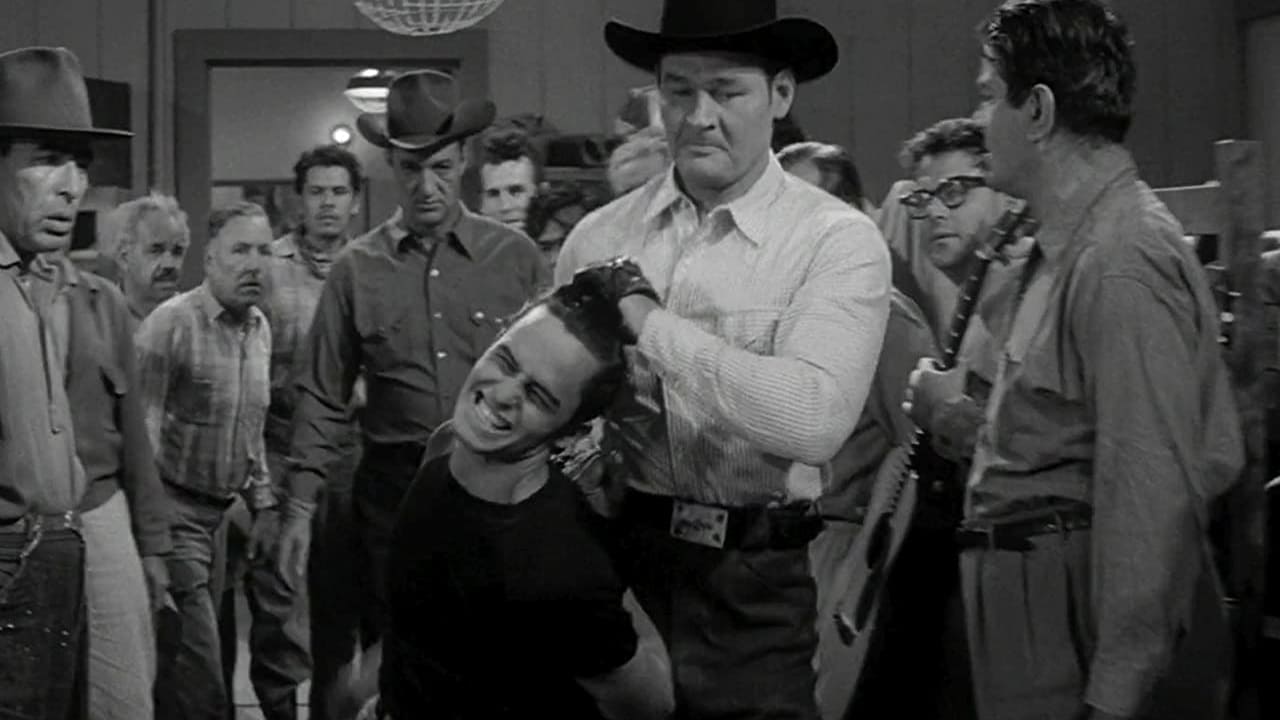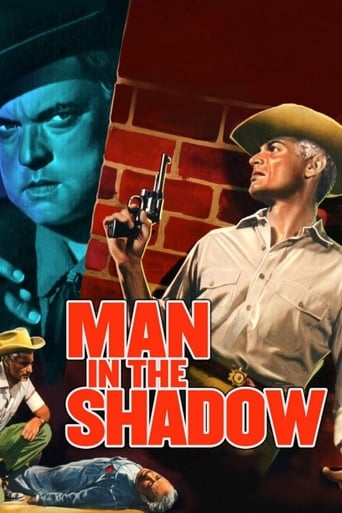Comwayon
A Disappointing Continuation
ChanFamous
I wanted to like it more than I actually did... But much of the humor totally escaped me and I walked out only mildly impressed.
Rio Hayward
All of these films share one commonality, that being a kind of emotional center that humanizes a cast of monsters.
Edwin
The storyline feels a little thin and moth-eaten in parts but this sequel is plenty of fun.
pensman
Somehow eerily prescient of today (2016) and at the same time not. Stumbled on this as it was being run on Showtime and as I hadn't heard of it, I DVR'd it to watch later. It reminds me in part of In the Heat of Night (Sidney Poitier) and Murder in Coweta County (Andy Griffith). The theme of a rich man running not only his business but the town or county he lives in is certainly not new. but done well here. Basically Virgil Renchler (Orson Wells) owner of the Golden Empire Ranch is upset as his daughter Skippy (Colleen Miller) has taken up a friendship with one of the migrants working on the ranch. Renchler tells some of boys to teach the boy a lesson. Enjoying the assignment, they go too far and kill the boy. The sheriff Ben Sadler (Jeff Chandler) finds he needs to look into the incident even though the townspeople are against it as Renchler basically "owns" and runs the town and after all it was only a wetback (Mexican) who was killed. The cover up results in a second murder and Sadler decides he has to make a choice: the law or the town. Eventually things spin so out of control that the townspeople find they too must decide. We have the expected resolution with Renchler being arrested. About two thirds into the film Sadler has a conversation with the town barber, Tony Santoro (Mario Siletti) who comments he understands the problems the Mexicans are facing more so than the other residents. He mentions his father had died recently at the age of 93; and after living in this country for thirty years, he still spoke no English. And as for Renchler, he adds that he, Santoro, still has relatives in Italy and that Sadler might recall they had a guy back there who ran the country the way Renchler runs the town. While it is a clear allusion to Mussolini, I suspect there are many viewers who wouldn't get it. Given the current political climate here and the attitude toward immigrants being espoused by some, the conversation has a certain poignancy and immediacy. Jeff Chandler does a good job here. He imbues his character with the nuances of conflict he is dealing with, and the consequences of his choices on himself, his wife, his town. Worth a watch if you can find it, or if you like movies that are supposed to make you think. Pretty impressive for a B film from 1957.
gordonl56
MAN IN THE SHADOW – 1957This Universal Studio's production is sort of a western updated to 1957. We have Orson Welles as the big land owner, Colleen Miller as his daughter and Jeff Chandler as the local Sheriff. The film is set in the American Southwest.The film starts on Welles' Golden Empire Ranch. A young Mexican farm hand, Joe Schneider, is dragged out of one of the ranch bunkhouses by two men, John Larch and Leo Gordon. They take Schneider to a nearby shed where they start to work the lad over. It seems that the young man has been over friendly with ranch owner Welles' daughter, Miller. Welles sent the two men to teach him a lesson. Schneider however is a stronger go than Gordon and Larch expected. A handy pick axe handle soon ends the fight by splitting the lad's skull open. Watching this whole thing from the shed window is, Martin Garralaga. Garralaga is another one of the many Mexican farmhands employed by Welles' ranch. He fades back into the dark and returns to the bunkhouse.The next morning, Garralaga decides to pay a visit to the law in the local town of Spurline. Spurline is a small one horse town with just a Sheriff, Jeff Chandler and one deputy, Ben Alexander. The town survives on the business it gets from Welles "bigger than some countries" Golden Empire Ranch.Garralaga tells his story to Chandler and Alexander. Alexander does not believe the "wetback" and urges Chandler to do the same. No point in rocking the boat with Welles without any proof. Chandler, newly elected, tells Alexander the law applies to everyone. He will go out and at least see if the young man is still there.Welles, who takes security serious, has armed men at the entrance to his property. After Welles has his men let Chandler in, Chandler politely asks about a possible "disturbance" on the ranch the night before involving a Mexican farmhand. "I have hundreds of wetbacks working here. You think I keep track of them all?' "Probably a couple of them got drunk and got in a fight." Welles also broadly hints that if Chandler wishes to keep his job, he best drop the matter. Chandler knows he'll need to dig up more evidence before pushing the matter. Back to town he goes to have a further talk the witness. Welles had only ordered his thugs to rough up Schneider. But since it ended up in murder, he is as guilty as Larch and Gordon. He calls the two into his office where they come up with a way to end the matter. Gordon takes the body of the slain young man down to an isolated spot on the highway. He dumps the body and then drives over it several times. He then contacts the Sheriff's office. He claims that the lad must have been drunk and wandered out into traffic. Deputy Alexander has no problem taking this story as gospel. When Welles' daughter, Miller, hears about Schneider's death, she contacts Chandler. Schneider and Miller had become friendly. Miller figures it most likely upset her father. Chandler adds this to the growing list of evidence. He decides to take precautions with his witness, and hides Garralaga at the farm of Royal Dano. Welles continues to stir the pot as he contacts the town managers, Paul Fix and William Schallert, and threatens to take his ranch business elsewhere. The less than subtle hint, "Get rid of Chandler or else". Welles' men also sabotage Chandler's Police car. Chandler is lucky to escape the wreck with only a few bumps and bruises. Besides the pressure from the town council to lay off the investigation, Chandler's wife, Barbara Lawrence is getting threatening phone calls. Add to all this is that the witness to the murder, Garralaga is himself murdered. This of course just makes the Sheriff all the more determined to solve the case.Welles now pulls out all the stops and has two of his men, Leo Gordon and Charles Horvath, jump Chandler. They lay a solid beating on the man and then drag him through the town streets from a rope tied to the back of a pickup. The message, Welles is really the man in charge. Chandler, who has been patched up by the local doc, Harry Harvey, has had more than enough. He arms himself with a shotgun and roars off to confront Welles at his ranch. The townsfolk, shamed by letting Welles walk all over them, arm up and likewise set off for the ranch. Needless to say there is a showdown at the ranch with several of Welles henchmen eating far too much lead than is good for them. Welles is slapped in cuffs and loaded up for a trip to jail. This one comes off as an upper level b-film, not great, but quite watchable. Welles is good as the old style land baron type. Chandler, is Chandler, he does nothing different here than we've seen in a dozen other films. Colleen Miller is more or less simply eye candy.The director, Jack Arnold, is best known for a series of great sci-fi films he made in the 1950's. These include, IT CAME FROM OUTER SPACE, CREATURE FROM THE BLACK LAGOON, REVENGE OF THE CREATURE, TARANTULA and THE INCREDIBLE SHRINKING MAN. He touched on noir with, THE TATTERED DRESS and OUTSIDE THE LAW. He would end his career helming episodes of THE LOVE BOAT. Some nice black and white work is supplied by Oscar winning (The Yearling) cinematographer, Arthur E Arling. Arling also received an Oscar nomination for his work on, I'LL CRY TOMORROW. The following year, Welles would make, TOUCH OF EVIL.
pdmh48
This is a good "pre-civil rights movement" western, continuing in the tradition of "High Noon" and "Bad Day at Black Rock". Colleen Miller plays Orson Welles daughter, (not his wife as someone posted previously.) Jeff Chandler (who died way too young at 42) is the sheriff and conscience in the film and he does a good job in this role. The fact that the cowboys have beaten a defenseless Chincano to death is something that most citizens in the town would rather forget.Chandler's character and his family are harassed by the murderous and prejudiced cowboys who work for Welles.The climax of this film is hard to watch even today. The director was Jack Arnold,who was great at expressing his opinions in low-budget films,such as "It Came from Outer Space" and "The Tattered Dress."
dinky-4
In a bit of a departure for its time, this movie begins with a brief pre-credits sequence, and it delays some of its credits till the very end. (During these closing credits, music is played which was also used in "It Came from Outer Space.")Aside from these minor touches, however, "Man in the Shadow" is a traditional, straightforward effort which would have once fitted unobtrusively into the bottom half of a double-bill. By 1957, however, these "B" movies were rapidly being replaced by TV programming and "Man in the Shadow" could easily have been converted into a one-hour television drama. The script might have been edited down by eliminating the role of Orson Welles' teenage daughter who only figures tangentially into the plot and who does not provide any "romantic interest" for Jeff Chandler since his character is already happily married.The plot is one of those "politically correct" affairs about the small-town lawman standing up against a powerful citizen in defense of a racial-minority member. The lawman's urged by his family and friends to leave well enough alone but a man's gotta do what a man's gotta do.
You might expect here one of Orson Welles' flamboyant (a.k.a. "hammy") performances but he's surprisingly restrained due, one suspects, simply to lack of interest in such a minor project. Jeff Chandler, amazingly enough, seems more compelling, and in the movie's most memorable moment he's dragged by his wrists down Main Street, sometimes on his belly, behind a pick-up truck. Jack Arnold directed this movie competently but without distinctive touches in a series of standard expository scenes. It pales in comparison to his other 1957 movie, "The Incredible Shrinking Man."

